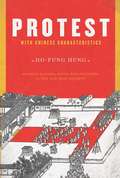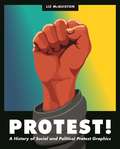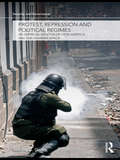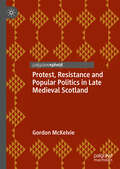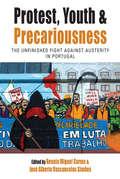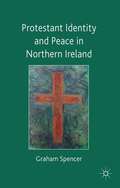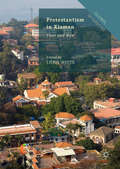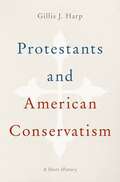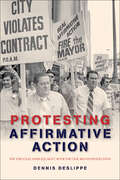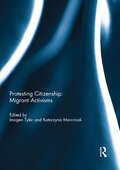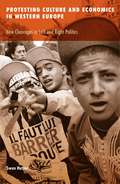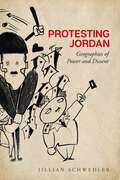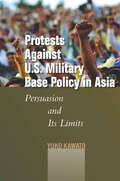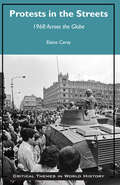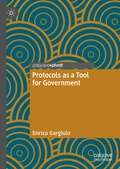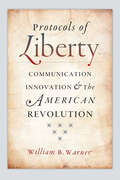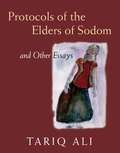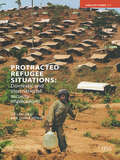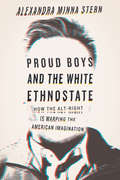- Table View
- List View
Protest with Chinese Characteristics: Demonstrations, Riots, and Petitions in the Mid-Qing Dynasty
by Ho-Fung HungThe origin of political modernity has long been tied to the Western history of protest and revolution, the currents of which many believe sparked popular dissent worldwide. Reviewing nearly one thousand instances of protest in China from the eighteenth to the early-nineteenth centuries, Ho-fung Hung charts an evolution of Chinese dissent that stands apart from Western trends. Hung samples from mid-Qing petitions and humble plaints to the emperor. He revisits rallies, riots, market strikes, and other forms of contention rarely considered in previous studies. Drawing on new world history, which accommodates parallels and divergences between political-economic and cultural developments East and West, Hung shows how the centralization of political power and an expanding market, coupled with a persistent Confucianist orthodoxy, shaped protesters' strategies and appeals in Qing China. This unique form of mid-Qing protest combined a quest for justice and autonomy with a filial-loyal respect for the imperial center, and Hung's careful research ties this distinct characteristic to popular protest in China today. As Hung makes clear, the nature of these protests prove late imperial China was anything but a stagnant and tranquil empire before the West cracked it open. In fact, the origins of modern popular politics in China predate the 1911 Revolution. Hung's work ultimately establishes a framework others can use to compare popular protest among different cultural fabrics. His book fundamentally recasts the evolution of such acts worldwide.
Protest!: A History of Social and Political Protest Graphics
by Liz McQuistonAn authoritative, richly illustrated history of six centuries of global protest artThroughout history, artists and citizens have turned to protest art as a means of demonstrating social and political discontent. From the earliest broadsheets in the 1500s to engravings, photolithographs, prints, posters, murals, graffiti, and political cartoons, these endlessly inventive graphic forms have symbolized and spurred on power struggles, rebellions, spirited causes, and calls to arms. Spanning continents and centuries, Protest! presents a major new chronological look at protest graphics.Beginning in the Reformation, when printed visual matter was first produced in multiples, Liz McQuiston follows the iconic images that have accompanied movements and events around the world. She examines fine art and propaganda, including William Hogarth’s Gin Lane, Thomas Nast’s political caricatures, French and British comics, postcards from the women’s suffrage movement, clothing of the 1960s counterculture, the anti-apartheid illustrated book How to Commit Suicide in South Africa, the “Silence=Death” emblem from the AIDS crisis, murals created during the Arab Spring, electronic graphics from Hong Kong’s Umbrella Revolution, and the front cover of the magazine Charlie Hebdo. Providing a visual exploration both joyful and brutal, McQuiston discusses how graphics have been used to protest wars, call for the end to racial discrimination, demand freedom from tyranny, and satirize authority figures and regimes.From the French, Mexican, and Sandinista revolutions to the American civil rights movement, nuclear disarmament, and the Women’s March of 2017, Protest! documents the integral role of the visual arts in passionate efforts for change.
Protest, Property and the Commons: Performances of Law and Resistance (Social Justice)
by Lucy Finchett-MaddockProtest, Property and the Commons focuses on the alternative property narratives of ‘social centres’, or political squats, and how the spaces and their communities create their own – resistant – form of law. Drawing on critical legal theory, legal pluralism, legal geography, poststructuralism and new materialism, the book considers how protest movements both use state law and create new, more informal, legalities in order to forge a practice of resistance. Invaluable for anyone working within the area of informal property in land, commons, protest and adverse possession, this book offers a ground-breaking account of the integral role of time, space and performance in the instituting processes of law and resistance.
Protest, Repression and Political Regimes: An Empirical Analysis of Latin America and sub-Saharan Africa (Security and Governance)
by Sabine C. CareyThis volume investigates the relationship between protest, repression and political regimes in Latin America and sub-Saharan Africa. Considering how different political regimes use repression and respond to popular protest, this book analyzes the relationship between protest and repression in Africa and Latin America between the late 1970s and the beginning of the twenty first century. Drawing on theories, multi-method empirical analyses and case studies, the author of this volume sets out to investigate the reciprocal dynamics between protest and repression. Distinctive features of this volume include: quantitative analyses that highlight general trends in the protest-repression relationship case studies of different political regimes in Chile and Nigeria, emphasising the dynamics at the micro-level an emphasis on the importance of full democratization in order to reduce the risk, and intensity, of intra-state conflict Focusing on political regimes in different areas of the world, Protest, Repression and Political Regimes will be of vital interest to students and scholars of conflict studies, human rights and social movements.
Protest, Resistance and Popular Politics in Late Medieval Scotland
by Gordon McKelvieThis book is the first sustained analysis of popular politics in Scotland during the fourteenth and fifteenth centuries. Despite the long-running historiography on popular protests in both England and continental Europe, there has been little discussion of this phenomenon in Scotland, in part because historians specialising in Scotland have paid little attention to the phenomenon of popular revolt, save an occasional comment in wider studies. There were no large-scale popular uprisings in Scotland, like the Peasants&’ Revolt in England, the Jacquerie in France, or the Ciompi in Florence, but that does not mean that the wider populace was not politically engaged. Indeed, many of the key sources for late medieval Scotland, including The Bruce, Scotichronicon, The Dethe of the Kynge of Scotis and the records of the Scottish parliament, all contain hints of popular political engagement. It is only when these sources are read with a focus on the lower echelons of society that a clearer picture—of a populace with political ideals they sought to uphold—emerges.
Protest, Youth and Precariousness: The Unfinished Fight against Austerity in Portugal (Protest, Culture & Society #27)
by Renato Miguel Carmo José Alberto Vasconcelos SimõesAfter over a decade of the austerity measures that followed the 2008 financial crisis—entailing severe, unpopular policies that have galvanized opposition and frayed social ties—what lies next for European societies? Portugal offers an interesting case for exploring this question, as a nation that was among the hardest hit by austerity and is now seeking a fresh path forward. This collection brings together sociologists, social movement specialists, political scientists, and other scholars to look specifically at how Portuguese youth have navigated this politically and economically difficult period, negotiating uncertain social circumstances as they channel their discontent into protest and collective action.
Protest-Aktivist*innen der Umweltschutz-Bewegung im Netz und auf der Straße: Voraussetzungen und Motive für Partizipation (Medien der Kooperation – Media of Cooperation)
by Lisa VilliothDieses Open-Access-Buch untersucht mit Fokus auf einzelne Bürger*innen fallspezifisch und empirisch den Handlungs- und Wirkungszusammenhang von Straßenprotest und Online-Aktivismus im Bereich der Umweltschutz-Bewegung. Eine ganze Bandbreite von Online- und Offline-Protestpraktiken erlaubt es Bürger*innen heutzutage, sich in politische Prozesse einzumischen, Öffentlichkeit für bestimmte Themen zu erzeugen und Politiker*innen und Unternehmen unter Druck zu setzen. Online ist hierbei jedoch nicht zwangsläufig Ersatz für Offline. In vielen Situationen von Protestpartizipation ergänzen sich Elemente beider Sphären. Warum entschließen sich Bürger*innen, ganz spezifischen Praktiken – online wie offline – nachzugehen und anderen Praktiken nicht? Welche Vor- und Nachteile benennen sie für die einzelnen ihnen zur Verfügung stehenden Formate? Die Arbeit steht im Schnittfeld unterschiedlicher politikwissenschaftlicher Forschungsfelder wie der Protestforschung, der politischen Partizipationsforschung und der Forschung rund um das Thema Digitalisierung. Basierend auf 18 Leitfaden-Interviews und einer ausführlichen Analyse werden sechs Typen von Protest-Aktivist*innen gebildet.
Protestant Identity and Peace in Northern Ireland
by Graham SpencerWhat role can and do Protestant churches play in the development of peace and stability in Northern Ireland? Drawing from interviews with a wide range of Protestant clergy, this book examines how identity impacts on the Protestant imagination and relates that identity to the possibility of peace. Using history and theology as a context for understanding the principles and values on which Protestantism is built, clergy talk about how those values and principles shape different Church attitudes towards forgiveness and reconciliation. Placing these comments alongside Catholic interviews, to demonstrate differences in Christian emphasis and conviction, the book moves towards a consideration of how positive relations between opposing communities might take shape and recommends a new outlook based on inclusive rather than exclusive narratives.
Protestantism and Politics in Eastern Europe and Russia: The Communist and Post-Communist Eras
by Sabrina P. RametComing at a time of enormous transformations in the one-time Communist bloc, this volume provides a much-needed perspective on the significance of church-state relations in the renaissance of civil society in the region. The essays collected here accentuate the peculiarly political character of Protestantism within Communist systems. With few identifiable leaders, a multiplicity of denominations, and a tendency away from hierarchical structures, the Protestant churches presents a remarkably diverse pattern of church-state relations. Consequently, the longtime coexistence of Protestantism and Communism in Eastern Europe and the former Soviet Union affords numerous examples of political accommodation and theological adaption that both reflect and foreshadow the dramatic changes of the 1990s.Based on extensive field research, including interviews with notable figures in the Protestant churches in the region, the essays in this volume address broad topics such as the church's involvment in environmentalism, pacifism, and other dissident movements, as well as issues particular to Russia, Poland, Czechoslovakia, East Germany, (1949-1989), Hungary, Yugoslavia (1945-1991), Bulgaria, and Romania. The final volume in the three-volume work "Christianity Under Stress," Protestantism and Politics in Eastern Europe and Russia will prove invaluable to anyone hoping to understand not only the workings of religion under Communism, but the historical and contemporary interactions of church and state in general.Contributors. Paul Bock, Lawrence Klippenstein, Paul Mojzes, Earl A. Pope, Joseph Pungur, Sabrina Petra Ramet, Walter Sawatsky, N. Gerald Shenk, Gerd Stricker, Sape A. Zylstra
Protestantism in Xiamen: Then and Now (Global Diversities)
by Chris WhiteThis interdisciplinary volume represents the first comprehensive English-language analysis of the development of Protestant Christianity in Xiamen from the nineteenth century to the present. This important regional study is particularly revealing due to the unbroken history of Sino-Christian interactions in Xiamen and the extensive ties that its churches have maintained with global missions and overseas Chinese Christians. Its authors draw upon a wide range of foreign missionary and Chinese official archives, local Xiamen church publications, and fieldwork data to historicize the Protestant experience in the region. Further, the local Christians’ stories demonstrate a form of sociocultural, religious and political imagination that puts into question the Euro-American model of Christendom and the Chinese Communist-controlled Three-Self Patriotic Movement. It addresses the localization of Christianity, the reinvention of local Chinese Protestant identity and heritage, and the Protestants’ engagement with the society at large. The empirical findings and analytical insights of this collection will appeal to scholars of religion, sociology and Chinese history.
Protestantism, Politics, and Women in Britain, 1660�1714
by Melinda S. ZookThis compelling new study examines the intersection between women, religion and politics in the late seventeenth and early eighteenth century in Britain. It demonstrates that what inspired Dissenting and Anglican women to political action was their concern for the survival of the Protestant religion both at home and abroad.
Protestants and American Conservatism: A Short History
by Gillis J. HarpThe rise of the modern Christian Right, starting with the 1976 Presidential election and culminating in the overwhelming white evangelical support for Donald Trump in the 2016 election, has been one of the most consequential political developments of the last half-century of American history. And while there has been a flowering of scholarship on the history of American conservatism, almost all of it has focused on the emergence of a conservative movement after World War II. Likewise, while much has been written about the role of Protestants in American politics, such studies generally begin in the 1970s, and almost none look further back than 1945. <p><p>In this sweeping history, the author traces the relationship between Protestantism and conservative politics in America from the Puritans to Palin. Christian belief long shaped American conservatism by bolstering its critical view of human nature and robust skepticism of human perfectibility. At times, Christian conservatives have attempted to enlist the state as an essential ally in the quest for moral reform. Yet, he argues, while conservative voters and activists have often professed to be motivated by their religious faith, in fact the connection between Christian principle and conservative politics has generally been remarkably thin. Indeed, with the exception of the seventeenth-century Puritans and some nineteenth-century Protestants, few American conservatives have constructed a well-reasoned theological foundation for their political beliefs. American conservatives have instead adopted a utilitarian view of religious belief that is embedded within essentially secular assumptions about society and politics. Ultimately, the author claims, there is very little that is distinctly Christian about the modern Christian Right.
Protesting Affirmative Action: The Struggle over Equality after the Civil Rights Revolution (Reconfiguring American Political History)
by Dennis DeslippeA lightning rod for liberal and conservative opposition alike, affirmative action has proved one of the more divisive issues in the United States over the past five decades. Dennis Deslippe here offers a thoughtful study of early opposition to the nation’s race- and gender-sensitive hiring and promotion programs in higher education and the workplace. This story begins more than fifteen years before the 1978 landmark U.S. Supreme Court case Regents of the University of California v. Bakke. Partisans attacked affirmative action almost immediately after it first appeared in the 1960s. Liberals in the opposition movement played an especially significant role. While not completely against the initiative, liberal opponents strove for "soft" affirmative action (recruitment, financial aid, remedial programs) and against "hard" affirmative action (numerical goals, quotas). In the process of balancing ideals of race and gender equality with competing notions of colorblindness and meritocracy, they even borrowed the language of the civil rights era to make far-reaching claims about equality, justice, and citizenship in their anti–affirmative action rhetoric. Deslippe traces this conflict through compelling case studies of real people and real jobs. He asks what the introduction of affirmative action meant to the careers and livelihoods of Seattle steelworkers, New York asbestos handlers, St. Louis firemen, Detroit policemen, City University of New York academics, and admissions counselors at the University of Washington Law School. Through their experiences, Deslippe examines the diverse reactions to affirmative action, concluding that workers had legitimate grievances against its hiring and promotion practices. In studying this phenomenon, Deslippe deepens our understanding of American democracy and neoconservatism in the late twentieth century and shows how the liberals’ often contradictory positions of the 1960s and 1970s reflect the conflicted views about affirmative action many Americans still hold today.
Protesting Citizenship: Migrant Activisms
by Imogen Tyler and Katarzyna MarciniakWhat does it mean to stateNo One is Illegal?. This rallying call is what unifies migrant protests against exclusionary border regimes around the world, bringing migrants, citizens, `legal` and `illegal` people onto the streets in ever greater numbers. Indeed, the last decade has witnessed an explosion of immigrant protests, political mobilizations by irregular migrants and pro-migrant activists. This edited collection aims to contribute to the growing body of scholarship on migrant resistance movements and to consider the implications of these struggles for critical understandings of citizenship and borders. It offers a rich series of theoretical and political interventions which together explore the tensions between integrationist and autonomous approaches, and between migrant and activist strategies of invisibility and visibility. By bringing immigrant protests to the heart of debates about citizenship, it also extends discussions about the limits and the possibilities of citizenship as the material and conceptual horizon of critical social analysis, political participation and democracy today.This book was published as a special issue of Citizenship Studies.
Protesting Culture and Economics in Western Europe: New Cleavages in Left and Right Politics (Social Movements, Protest and Contention #41)
by Swen HutterIn this far-reaching work, Swen Hutter demonstrates the usefulness of studying both electoral politics and protest politics to better understand the impacts of globalization. Hutter integrates research on cleavage politics and populist parties in Western Europe with research on social movements. He shows how major new cleavages restructured protest politics over a thirty-year period, from the 1970s through the 1990s. This major study brings back the concept of cleavages to social movement studies and connects the field with contemporary research on populism, electoral behavior, and party politics.Hutter&’s work extends the landmark 1995 New Social Movements in Western Europe, the book that spurred the recognition that a broad empirical frame is valuable for understanding powerful social movements. This new book shows that it is also beneficial to include the study of political parties and protest politics. While making extensive use of public opinion, protest event, and election campaigning data, Hutter skillfully employs contemporary data from six West European societies—Austria, Britain, France, Germany, the Netherlands, and Switzerland—to account for responses to protest events and political issues across countries.Protesting Culture and Economics in Western Europe makes productive empirical, methodological, and theoretical contributions to the study of social movements and comparative politics. Empirically, it employs a new approach, along with new data, to explain changes in European politics over several decades. Methodologically, it makes rigorous yet creative use of diverse datasets in innovative ways, particularly across national borders. And theoretically, it makes a strong claim for considering the distinctive politics of protest across various issue domains as it investigates the asymmetrical politics of protest from left and right.
Protesting Jordan: Geographies of Power and Dissent (Stanford Studies in Middle Eastern and Islamic Societies and Cultures)
by Jillian SchwedlerProtest has been a key method of political claim-making in Jordan from the late Ottoman period to the present day. More than moments of rupture within normal-time politics, protests have been central to challenging state power, as well as reproducing it—and the spatial dynamics of protests play a central role in the construction of both state and society. With this book, Jillian Schwedler considers how space and geography influence protests and repression, and, in challenging conventional narratives of Hashemite state-making, offers the first in-depth study of rebellion in Jordan. Based on twenty-five years of field research, Protesting Jordan examines protests as they are situated in the built environment, bringing together considerations of networks, spatial imaginaries, space and place-making, and political geographies at local, national, regional, and global scales. Schwedler considers the impact of time and temporality in the lifecycles of individual movements. Through a mixed interpretive methodology, this book illuminates the geographies of power and dissent and the spatial practices of protest and repression, highlighting the political stakes of competing narratives about Jordan's past, present, and future.
Protests Against U.S. Military Base Policy in Asia: Persuasion and Its Limits
by Yuko KawatoSince the end of World War II, protests against U. S. military basing and related policies have occurred in several Asian host countries that are key U. S. allies. These protests are a matter of considerable concern to the United States as it attempts to project power across a world in which its basing policies remain highly contentious. Many episodes of contention raise important questions about the extent to which protests have and will influence policy regarding U. S. military bases in Asia. Protests Against U. S. Military Base Policy in Asia answers these questions by examining state response to twelve major protests in Asia since the end of World War II-in the Philippines, Okinawa, and South Korea. Yuko Kawato lays out the conditions under which protesters' normative arguments can and cannot persuade policy-makers to change base policy, and how protests can still generate some political or military incentives for policy-makers to adjust policy when persuasion fails. Kawato also shows that when policy-makers decide not to change policy, they can offer symbolic concessions to appear norm-abiding and to secure a smoother implementation of policies that protesters oppose. While the findings will be of considerable interest to academics and students, perhaps their largest impact will be on policy makers and activists, for whom Kawato offers recommendations for improving their decision-making and actions.
Protests in the Streets: 1968 Across the Globe
by Alfred J. Andrea Elaine Carey"A really interesting and provocative take on 1968. This book addresses the truly global dimensions—and the unexpected, often long-term consequences—of that year of protest. It's an original and highly usable comparative history sure to attract student interest." —Peter N. Stearns, George Mason University
Protests, Pandemic, and Security Predicaments: Hong Kong, Taiwan, China, and the US in the 2020s
by Wei-Chin LeeThis book examines how Asian countries have responded to urgent challenges against a backdrop of climactic political developments, as well as the effects of issue linkage in policy making. Chapters are arranged according to localities but interlinked through their thematic and critical analyses. The section on Hong Kong focuses on the theme of protests, highlighting its intersection with identity and generational shifts in addition to legal, political and economic changes before and after the adoption of Hong Kong National Security Law. The section examining Taiwan’s policies discusses electoral calculations, identity reconstruction, cross-Strait stalemate and alliance maneuvers within USA-China-Taiwan triangular international relations, providing an overview of its domestic and external policies. Through their analysis, the authors here determine that China has emphasized the prerogatives of history, culture and territorial sovereignty in its dealings with the Hong Kong protests and Taiwan, and that cross-Strait analysis must be deliberated and ultimately determined within the USA-China-Taiwan triangular framework. In the final section, authors examine the USA’s role and policy in dealing with both sides of the Taiwan Strait. Hegemonic power transition has been a primary concern in both countries with the USA’s hegemonic status facing daunting challenges from China, increasingly perceived as an ascending revisionist power waiting to overtake the USA in the future.
Protocol: The Power of Diplomacy and How to Make It Work for You
by Capricia Penavic MarshallPresident Obama’s former United States chief of protocol looks at why diplomacy and etiquette matter—and how they can help you in everyday life.In her roles as chief of protocol for President Barack Obama and social secretary to President Bill Clinton and First Lady Hillary Clinton, Capricia Penavic Marshall not only bore witness to history, but she also facilitated it. From curating rooms to have an intended impact to knowing which cultural gestures earned trust, her detailed measures were superpower influences that laid the groundwork for successful diplomacy between leaders and tilted the advantage, always, in her team’s favor. Sharing unvarnished anecdotes of harrowing near misses and exhilarating triumphs, Marshall offers the master class in soft power.Praise for Protocol“A trusted friend and a trusted colleague. I can’t imagine anyone who has been a greater public servant.” —Hillary Clinton“Working with Capricia during the Obama administration was nothing short of wonderful! Her guiding hand and innovative methods laid the foundation for our successful diplomacy on the world stage.” —Valerie Jarrett, former senior advisor to Barack Obama and author of Finding My Voice“Fascinating. . . . An informative and often charming primer on a little-known—but vital—government post.” —Kirkus Reviews
Protocols as a Tool for Government
by Enrico GargiuloThis book provides a genealogy of the concept of ‘protocol’ in government. It examines the functions that different protocols play in the contemporary world, and how they act as devices which regulate delicate and strategic fields of politics and society. The book opens by assessing the historical origins of the word ‘protocol’, proposes a typology of protocols, and highlights the three main actions of these devices: formalising, standardising, and certifying. It then stresses the ways in which protocols are employed as governing devices, their use as policy instruments, and their role within capitalism. The book concludes by analysing protocol as a method for managing various aspects of social life. The politics of protocols and the dilemmas they present, especially within crisis and emergency scenarios, are also discussed. The book will appeal to scholars and students of public policy, sociology, political philosophy and the theory of law.
Protocols of Liberty: Communication Innovation and the American Revolution
by William B. WarnerThe fledgling United States fought a war to achieve independence from Britain, but as John Adams said, the real revolution occurred OC in the minds and hearts of the peopleOCO before the armed conflict ever began. Putting the practices of communication at the center of this intellectual revolution, "Protocols of Liberty" shows how American patriotsOCothe WhigsOCoused new forms of communication to challenge British authority before any shots were fired at Lexington and Concord. aTo understand the triumph of the Whigs over the Brit-friendly Tories, William B. Warner argues that it is essential to understand the communication systems that shaped pre-Revolution events in the background. He explains the shift in power by tracing the invention of a new political agency, the Committee of Correspondence; the development of a new genre for political expression, the popular declaration; and the emergence of networks for collective political action, with the Continental Congress at its center. From the establishment of town meetings to the creation of a new postal system and, finally, the Declaration of Independence, "Protocols of Liberty" reveals that communication innovations contributed decisively to nation-building and continued to be key tools in later American political movements, like abolition and womenOCOs suffrage, to oppose local custom and state law.
Protocols of the Elders of Sodom and Other Essays
by Tariq AliThe essays and diary entries explore the links between literature, history and politics. Inviting the reader to share in the frustrations and pleasures of world literature and showcasing Ali's range and polemical verve, this collection will be sure to attract critical attention and a wide readership.
Protracted Refugee Situations: Domestic and International Security Implications (Adelphi series #375)
by Gil Loescher James MilnerProtracted refugee populations not only constitute over 70% of the world's refugees but are also a principal source of many of the irregular movements of people around the world today. The long-term presence of refugee populations in much of the developing world has come to be seen by many host states in these regions as a source of insecurity.In response, host governments have enacted policies of containing refugees in isolated and insecure camps, have prevented the arrival of additional refugees and, in extreme cases, have engaged in forcible repatriation. Not surprisingly, these refugee populations are also increasingly perceived as possible sources of insecurity for Western states. Refugee camps are sometimes breeding grounds for international terrorism and rebel movements. These groups often exploit the presence of refugees to engage in activities that destabilise not only host states but also entire regions.
Proud Boys and the White Ethnostate: How the Alt-Right Is Warping the American Imagination
by Alexandra Minna SternWhat is the alt-right? What do they believe, and how did they take center stage in the American social and political consciousness?From a loose movement that lurked in the shadows in the early 2000s, the alt-right has achieved a level of visibility that has allowed it to expand significantly throughout America's cultural, political, and digital landscapes. Racist, sexist, and homophobic beliefs that were previously unspeakable have become commonplace, normalized, and accepted--endangering American democracy and society as a whole. Yet in order to dismantle the destructive movement that has invaded our public consciousness, we must first understand the core beliefs that drive the alt-right.To help guide us through the contemporary moment, historian Alexandra Minna Stern excavates the alt-right memes and tropes that have erupted online and explores the alt-right's central texts, narratives, constructs, and insider language. She digs to the root of the alt-right's motivations: their deep-seated fear of an oncoming "white genocide" that can only be remedied through swift and aggressive action to reclaim white power. As the group makes concerted efforts to cast off the vestiges of neo-Nazism and normalize their appearance and their beliefs, the alt-right and their ideas can be hard to recognize. Through careful analysis, Stern brings awareness to the underlying concepts that guide the alt-right and animate its overlapping forms of racism, xenophobia, transphobia, and anti-egalitarianism. She explains the key ideas of "red-pilling," strategic trolling, gender essentialism, and the alt-right's ultimate fantasy: a future where minorities have been removed and "cleansed" from the body politic and a white ethnostate is established in the United States. By unearthing the hidden mechanisms that power white nationalism, Stern reveals just how pervasive this movement truly is.
